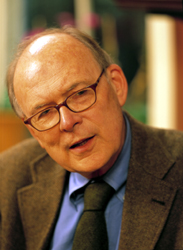James Chace facts for kids
James Clarke Chace (born October 16, 1931 – died October 8, 2004) was an American historian. He wrote many books about how America deals with other countries, which is called diplomacy, and how the government manages its affairs, known as statecraft. One of his most famous books was Acheson: The Secretary of State Who Created the American World (1998). This book was about Dean Acheson, who was a very important Secretary of State. Even George W. Bush mentioned reading Chace's book during a presidential debate in 2000.
Chace's writing was known for being clear and well-written. His ideas often helped shape how American leaders thought about foreign policy. For example, he helped create the phrase "the indispensable nation" with Sidney Blumenthal. This phrase became widely used by Secretary of State Madeleine Albright in her speeches to describe America's important role in the world.
Contents
Early Life and Education
James Chace was born and grew up in Fall River, Massachusetts. His family was from an old, well-known group in New England. However, they lost almost all their money during the Great Depression. This was a time in the 1930s when many people lost their jobs and savings because of a big economic crisis. Chace wrote about this experience in his 1990 book called What We Had.
He went to Harvard University and studied Classics, which means he learned about ancient Greek and Roman history and languages. In 1954, he traveled to France to study famous artists and writers like Eugène Delacroix and Charles Baudelaire. But soon, he became very interested in the political and literary ideas of that time. He was especially drawn to French writers like Albert Camus and Jean-Paul Sartre.
Time in France
Later that same year, Chace returned to France as a soldier. In 1955 and 1956, he worked as a translator for the Army. His job was to translate French newspapers for the Central Intelligence Agency (CIA), which is a U.S. government agency that gathers information about other countries. While in France, he wrote a novel. He also saw how France was dealing with leaving Vietnam and facing problems with a rebellion in its colony, Algeria. These experiences likely shaped his interest in international affairs.
A Career in Foreign Policy
After returning to the United States, Chace's interest in foreign policy grew even more. From 1959 to 1969, he worked as the managing editor for East Europe. This was a political magazine that focused on countries in the Soviet bloc, which were countries in Eastern Europe that were closely tied to the Soviet Union. During this time, he wrote a book called Conflict in the Middle East about the Six-Day War.
He also served as a managing editor for other important foreign policy magazines:
- Interplay (1967–1970)
- Foreign Affairs (1970–1983)
In 1993, he became the editor of the World Policy Journal and worked there for seven years.
Teaching and Writing
In 1990, James Chace became a Professor of Government at Bard College in Annandale-on-Hudson, New York. He later helped start and lead Bard's international affairs program, called the Bard Globalization and International Affairs Program (BGIA), in New York City.
His articles were often printed in the opinion sections of newspapers. He also wrote reviews for the New York Times Book Review during the 1980s and 1990s.
Chace's Views on American Power
James Chace's work often focused on how American leaders should act on the world stage. He explored the balance between America's interests and its values, and how the country should use its power. He believed that good leaders understand that a nation has limited resources, including money, soldiers, and public support. To protect the country's interests, these resources should not be used up too quickly.
His friend and fellow writer, Mark Danner, said that Chace saw the Vietnam War as a clear example of a country failing to use its resources wisely. Chace also viewed the Iraq War as another similar mistake.
Later Life
James Chace passed away from a heart attack in Paris on October 8, 2004. He was in Paris doing research for a book about the Marquis de Lafayette, which would have been his tenth book. At the time of his death, Chace lived in New York City. He was a close friend and mentor to military historian Caleb Carr and historian David Fromkin.


